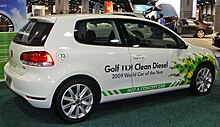
 |
| Environment |
|---|
|
| Part of a series on |
| Green politics |
|---|
 |
Greenwashing (a compound word modeled on "whitewash"), also called green sheen,[1][2] is a form of advertising or marketing spin that deceptively uses green PR and green marketing to persuade the public that an organization's products, goals, or policies are environmentally friendly.[3] Companies that intentionally adopt greenwashing communication strategies often do so to distance themselves from their environmental lapses or those of their suppliers.[4] Firms engage in greenwashing for two primary reasons: to appear legitimate and to project an image of environmental responsibility to stakeholders.[5]
An example of greenwashing occurs when an organization spends significantly more resources on advertising being "green" than on environmentally sound practices.[6] Greenwashing can range from changing the name or label of a product to evoke the natural environment: for example, on a product containing harmful chemicals, to multimillion-dollar campaigns that portray companies with large carbon footprints as eco-friendly. Greenwashing covers up unsustainable corporate agendas and policies.[7] Highly public accusations of greenwashing have contributed to the term's increasing use.[8]
Many corporations use greenwashing to improve public opinion of their brands. Complex corporate structures can further obscure the bigger picture.[9] Corporations attempt to capitalize off of consumer's environmental guilt.[10] Critics of the practice suggest that the rise of greenwashing, paired with ineffective regulation, contributes to consumer skepticism of all green claims and diminishes the power of the consumer to drive companies toward greener manufacturing processes and business operations.[11]
Greenwashing has recently increased to meet consumer demand for environmentally-friendly goods and services. New regulations, laws, and guidelines put forward by organizations such as the Committee of Advertising Practice in the UK aim to discourage companies from using greenwashing to deceive consumers.[12]
- ^ "Season 5: It's Not Easy Being Green: Green Marketing". CBC Radio. 2011-01-08. Archived from the original on 2011-08-04. Retrieved 2022-07-30.
- ^ "LP: 'The biggest environmental crime in history'". libertypost.org. Archived from the original on 2013-01-16. Retrieved 2009-09-11.
- ^ Williams, Joe (2024). "Greenwashing: Appearance, illusion and the future of 'green' capitalism". Geography Compass. 18 (1). Bibcode:2024GComp..18E2736W. doi:10.1111/gec3.12736.
- ^ Pizzetti, Marta; Gatti, Lucia; Seele, Peter (April 2021). "Firms Talk, Suppliers Walk: Analyzing the Locus of Greenwashing in the Blame Game and Introducing 'Vicarious Greenwashing'" (PDF). Journal of Business Ethics. 170 (1): 21–38. doi:10.1007/s10551-019-04406-2. S2CID 214383794.
- ^ Walker, Kent; Wan, Fang (2012-08-01). "The Harm of Symbolic Actions and Green-Washing: Corporate Actions and Communications on Environmental Performance and Their Financial Implications". Journal of Business Ethics. 109 (2): 227–242. doi:10.1007/s10551-011-1122-4. ISSN 1573-0697.
- ^ "Greenpeace | Greenwashing". stopgreenwash.org. Retrieved 2016-07-07.
- ^ Karliner, Joshua (2001-03-22). "A Brief History of Greenwash". corpwatch.org. Archived from the original on 2016-11-09. Retrieved 2018-03-23.
- "Top 10 Greenwashing Companies In America". Huffington Post. 2011-05-25. Retrieved 2022-07-30.
- ^ Seele, Peter; Gatti, Lucia (2015). "Greenwashing Revisited: In Search of a Typology and Accusation-Based Definition Incorporating Legitimacy Strategies". Business Strategy and the Environment. 26 (2): 239–252. doi:10.1002/bse.1912.
- ^ Condon, Madison. "Climate Change's New Ally: Big Finance". Boston Review. Retrieved 2022-04-06.
- ^ Sheehan, Kim Bartel; Lee, Joonghwa (2014-10-01). "What's Cruel About Cruelty Free: An Exploration of Consumers, Moral Heuristics, and Public Policy". Journal of Animal Ethics. 4 (2): 1–15. doi:10.5406/janimalethics.4.2.0001. ISSN 2156-5414.
- ^ Dahl, Richard (2010-06-01). "Greenwashing: Do You Know What You're Buying?". Environmental Health Perspectives. 118 (6): a246–a252. doi:10.1289/ehp.118-a246. PMC 2898878. PMID 20515714.
- ^ Thornton, Gabriella (2022-05-18). "New Environmental Claims Guidance from CAP, BCAP and the European Commission". marketinglaw.osborneclarke.com. Retrieved 2022-11-05.